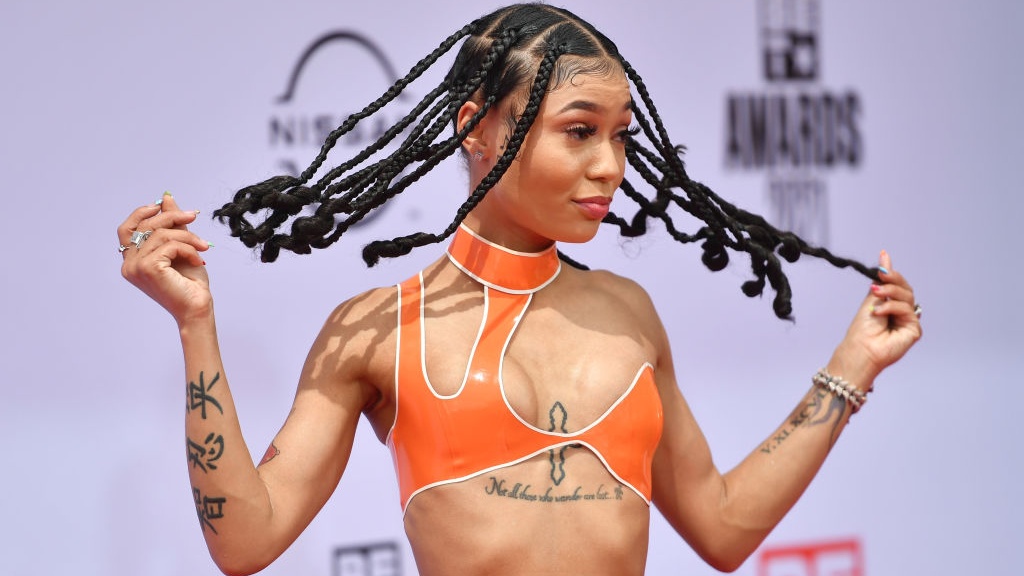If you've spent a fair amount of time on social media in the past couple of weeks, you were likely to come across semi-shockingly cruel commentary about 24-year-old hip-hop newcomer, Coi Leray. The young rapper rose to prominence with hit songs like “Big Purr (Prrdd).”
But earlier this summer, it wasn't her bops that had her name in headlines. Following her appearance at the 2021 BET Awards — the theme of which was, ironically, centered on Black women — Leray found herself having to fend off body shamers.
When Leray initially hopped onto the rap scene, she was met with chart-topping, critical acclaim. When she started expressing confidence in her body image and creativity, there was a palpable shift in the public's reception of the young artist. She went from being positioned as hip-hop’s potential new darling to being a target for those who believe Black women should be humbled into subservience.
The criticisms following the Boston native's July XXL 2021 Freshman Class cypher were incessant. Most of the commentary surrounding the femcee did little to address her actual artistry and did much more by way of attempting to desecrate her self-esteem with needless hot takes that border on sexism, body shaming and harassment.
It's to be expected that performers are held accountable for their lyricism and content, but at what does the commentary go from just that to misogynoir masked behind flimsy "critiques."
The rapper herself has spoken candidly on the dangers that can ensue as a result of the tormenting many celebrities face.
Lot of y’all do this bullying shit to every celebrity. I get it, y’all human. But a lot of people don’t understand how much it could kill someone. If you tryna kill me, just know I ain’t afraid to die. Im ready for whatever
— PRESSURE ⭐️ (@coi_leray) March 30, 2021
Predictably enough, we rarely see Leray’s male counterparts picked apart so profusely all in the name of social media fodder.
This fickle energy that emerges as intense adulation — putting Black women celebrities on pedestals and then tearing them down using that very platform when they don’t adhere to unwritten rules — is in desperate need of abolition. Black women rappers have to meet an unreasonably high level of excellence when their male counterparts are able to evade any and all criticism while coasting through on their mediocrity. It's very much giving double standards.
When one thinks of misogynoir, it isn't always the outwardly, verbose acts of discrimination. It can rear its ugly head in complete subtlety as well. The duality of it all is deafening, with Leray being the perfect example of both. On social media, she's ridiculed for her figure but the way that she is treated as a figurehead, being bounced around from "most loved" to "most hated" in a matter of moments is truly a testament to the way that Black women are undervalued and dissected like science experiments.
What's been interesting about all of the commentary spewed towards Leray is that it has seemingly become the norm to tear her apart in digital spaces. Sure, there's definitely some misogynoir showing up but it's more nuanced than that — it appears that these droves of internet trolls have made it a sport to cyberbully a Black woman who doesn't fit into the confines of what it means to be their ideal Black woman.
Previously, when confronting immoderate cyberbullying, Leray has made it clear that any and all naysayers who have their qualms about her posterior should get used to it. Leray's utter confidence in herself, namely her appearance, is an understated act of rebellion.
Get use to my body because I’m never changing anything on it
— PRESSURE ⭐️ (@coi_leray) March 30, 2021
Black women deserve to have the empowerment to be their most authentic selves without fear of the damnation that eventually follows. If you let the everlasting rendezvous between the patriarchy and white supremacy tell it: Black women's joy is the 8th deadly sin.
The onslaught of excessive and unwarranted dialogue around Leray is a tale as old as time. When Beyoncé decided to become more forthright in discussing her sexuality within her music, she was literally called a "whore" by a UK newspaper. In recent weeks, Naomi Osaka and Simone Biles have faced public persecution for choosing to prioritize mental health by people who probably can’t even complete a somersault.
When Black women possess at least a semblance of self-assurance, the world takes it upon itself to humble them in its best attempt.
If Leray had been a white pop star, she'd be praised for her body type and hailed as the picture of perfect health. Because she's a Black woman, she's expected to live up to unrealistic expectations and take humiliation in stride. Black women are more than the restrictive boxes that this world creates for them and they deserve more. Leray is a human just like everyone else and, in turn, deserves the same respect as everyone else. And she deserves to bask in all of her self-esteem.
If we spent as much time dismantling misogynoir as we do with every other injustice, the current barometer for our treatment of Black women might not be in the gutter.

